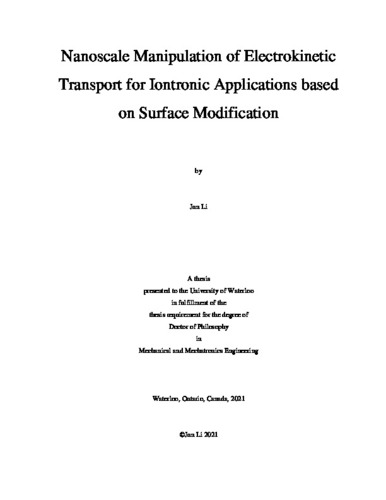| dc.description.abstract | Electrokinetic transport demonstrates a lot of new physical behaviors in nanofluidic systems due to the high surface-to-volume ratios and interactions between the fluid and walls of nanofluidic systems. The unique properties of electrokinetic transport in nanoscale offer possibilities for applications in many fields, such as biological computing, sensing, and drug delivery. Fundamental studies of electrokinetic transport phenomena in nanoscale have been investigated numerically and experimentally. However, the precise manipulation of electrokinetic transport in nanoscale is still a great challenge. Traditional nanofluidic devices are difficult to achieve practical applications due to their low accuracy and sensitivity. Surface modification is a promising method to develop nanofluidic devices with more functionalities. Up to date, the experimental study of electrokinetic transport in modified nanochannels is still limited.
This thesis systematically studies the electrokinetic transport phenomena in surface-modified polydimethylsiloxane (PDMS) nanochannels, as well as applications of chip-scale nanofluidic devices with surface modifications. At the beginning of this thesis, electroosmotic flow (EOF) is measured in pristine PDMS single nanochannels by the current-slope method. This nanochannel is fabricated by using solvent-induced cracking method and used to form a nanofluidic chip. The effects of ion size, ion valence, and pH of electrolyte solutions on the velocity of EOF in the nanochannel are experimentally studied. These results will serve as control data for the following studies of electrokinetic transport phenomena in modified nanochannels.
Then two fundamental research projects are conducted in nanochannels modified with DNA and charged polyelectrolytes to study the effects of surface modifications on electrokinetic transport phenomena. Electroosmotic flow is systematically investigated in DNA grafted hard PDMS (h-PDMS) channels with the channel size ranging from 50 nm to 2.5 μm by using the current-slope method. The effects of the DNA types, the incubation time, the pH value, the ionic concentration of electrolyte solutions, and the UV (ultraviolet) illumination on the EOF velocity are experimentally studied. The comparisons between the EOF in pristine nanochannels and DNA grafted nanochannels indicate that the surface modification of nanochannel can significantly affect the electrokinetic transport. Furthermore, the transport of fluid can be regulated by UV illumination in DNA grafted nanochannels. The size and surface charge of nanochannels after the layer-by-layer (LBL) deposition of polyelectrolytes are experimentally measured. The results reveal that the increment of the coated multilayer thickness will be limited in small nanochannels. A minimum size of nanochannel exists when the nanochannel is modified by using LBL deposition of polyelectrolytes. This minimum size depends on the salt additive in the polyelectrolyte solutions. In addition, the surface charge of the modified nanochannels is determined by the outmost coated layer. The EOF can be alternatively reversed in the modified nanochannels by repeatedly coating oppositely charged polyelectrolytes.
Based on the results from the fundamental studies, a nanofluidic diode is developed by modifying the surface charge and size of a nanochannel with charged polyelectrolytes. The surface charge-governed electrokinetic transport of mobile ions results in diode-like behaviors of ionic current in the modified nanochannel. The working principle of the nanofluidic diode is explained and experimentally verified. The effects of the operation parameters, including ionic concentration, nanochannel length, and frequency, are systematically investigated. Two applications of the nanofluidic diode are presented in this thesis: improved resistive pulse sensing (RPS) system and iontronic circuits. A nanofluidic diode is fabricated and integrated into a RPS system serving as the sensing gate. A mathematic model for the modified RPS system is developed to evaluate the RPS signals. Nanoparticles with a diameter of 5 nm are also experimentally detected in the modified nanochannel-based RPS system. The experimental results are in good agreement with the numerical simulation results. By comparing the RPS signals in the modified nanochannel with that in the pristine nanochannel, it is found that RPS signals can be enhanced by approximately 50% when a nanofluidic diode is used as the sensing nanochannel. By integrating multiple nanofluidic diodes into a PDMS chip, iontronic circuits are developed. The performances of the iontronic circuits working as bipolar junction transistor and full-wave rectifier are examined and demonstrated. Signal manipulation and current rectification with high accuracy can be achieved by these iontronic circuits.
This thesis develops simple methods to modulate electrokinetic transport in nanochannels by surface modifications. The fundamental research in this thesis expands the understanding of electrokinetic transport phenomena in nanochannels with various surface modifications. The iontronic devices fabricated by using modified nanochannels provide new possibilities in the development of nanofluidic systems with more functionalities, toward improved biological computing and sensing. | en |

